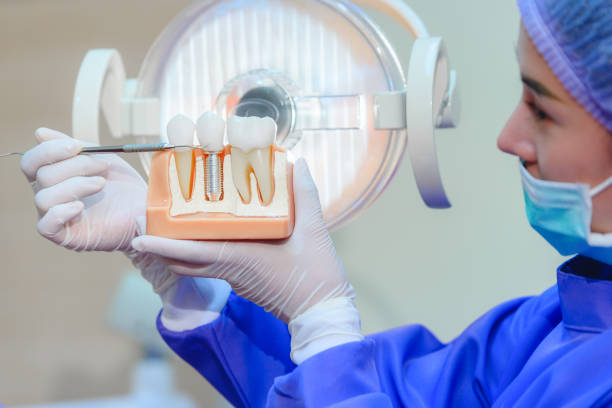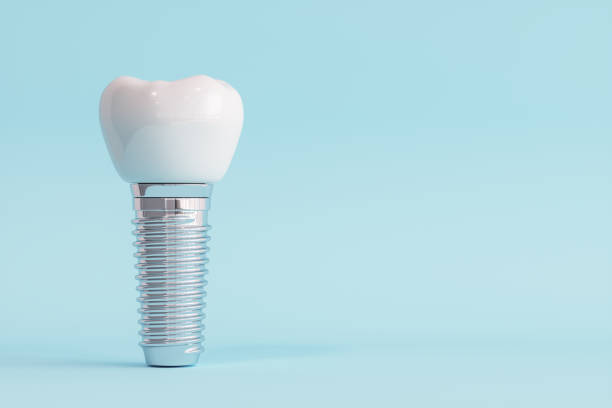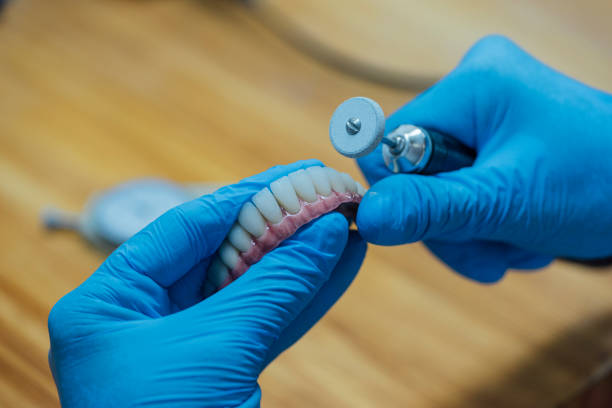Dental implants have become an increasingly popular option for patients looking to replace missing or damaged teeth. But with different types of dental implants available, it can be challenging to know which one is right for you. Here at TruSmile, we can help you find out more about the most common types of dental implants.
Types of Dental Implants
There are four common types of dental implants, including endosteal implants, subperiosteal implants, zygomatic implants, and All-on-4 implants. By understanding the different types of dental implants, patients can work with their dentist or oral surgeon to determine the best option for their unique needs and goals.
Endosteal Implants
Endosteal implants are the most commonly used type of dental implant. They are surgically placed directly into the jawbone and act as artificial tooth roots. Endosteal implants are typically made of titanium and are shaped like small screws. Once the implant is placed, a dental crown is attached to the top of the implant, creating a natural-looking tooth replacement.
Subperiosteal Implants
Subperiosteal implants are less common than endosteal implants but are still used in specific cases. Subperiosteal implants are placed under the gum tissue, but above the jawbone. A metal frame is fitted onto the jawbone, and as the gums heal, the frame becomes fixed in place. Once the implant is secure, a dental crown is attached to the top, completing the tooth replacement.
Zygomatic Implants
Zygomatic implants are used when traditional implants are not possible. These implants are placed in the upper jawbone, where there is often less bone density. Zygomatic implants are longer than endosteal implants and are anchored to the cheekbone instead of the jawbone.
All-on-4 Implants
All-on-4 implants are a type of implant-supported denture. These implants use four strategically placed implants to support a full arch of teeth. All-on-4 implants are designed to be a more cost-effective and less invasive alternative to traditional dentures.
Mini Dental Implants
Mini dental implants are a smaller version of traditional implants. They are used when there is not enough space for a traditional implant. Mini implants are also less invasive, as they require less bone to be removed. Mini implants are typically used to support a crown or a bridge.
Which Type of Implant Is Right for You?
The types of dental implants that are right for you will depend on several factors, including the location of the missing tooth or teeth, the condition of your jawbone, and your overall oral health. Your dentist will be able to recommend the best type of implant for your specific needs.
Benefits of Types of Dental Implants
Different types of dental implants are a popular and effective option for replacing missing teeth. They offer numerous benefits, both in terms of appearance and functionality, compared to traditional tooth replacement options like dentures and bridges.
- Improved appearance: Dental implants are designed to look and feel like natural teeth, and are custom-made to match the color and shape of your existing teeth. This means that they blend seamlessly with your natural teeth, helping to restore your smile and your confidence.
- Improved speech: Missing teeth can affect your ability to speak clearly, particularly if they are located in the front of your mouth. Dental implants can help to restore your ability to speak clearly and confidently, helping to improve your overall quality of life.
- Improved comfort: Unlike dentures, which can be uncomfortable and ill-fitting, dental implants are designed to fit securely and comfortably in your mouth. They are anchored directly into your jawbone, which means that they are extremely stable and do not slip or move around like dentures can.
- Improved chewing ability: Dental implants are designed to function like natural teeth, which means that they are able to withstand the forces of biting and chewing. This means that you can eat your favorite foods without worrying about your dental implant becoming loose or falling out.
- Long-lasting: With proper care and maintenance, dental implants can last for many years or even a lifetime. This makes them a cost-effective option in the long term, especially when compared to traditional tooth replacement options that may need to be replaced every few years.
- Improved oral health: Unlike other tooth replacement options, which can require the removal of healthy tooth structure, dental implants do not require any alteration to your existing teeth. This helps to preserve your natural teeth and promote better overall oral health.
- Improved bone health: When a tooth is lost, the jawbone underneath can begin to deteriorate over time. Dental implants are the only tooth replacement option that can stimulate the growth of new bone tissue in the jaw, helping to maintain healthy bone density and prevent further bone loss.
Dental implants are a popular and effective tooth replacement option that can improve the functionality, aesthetics, and overall health of your mouth. With different types of dental implants available, it’s important to discuss your options with us at TruSmile Dental Implant Center to determine which implant is right for you.



